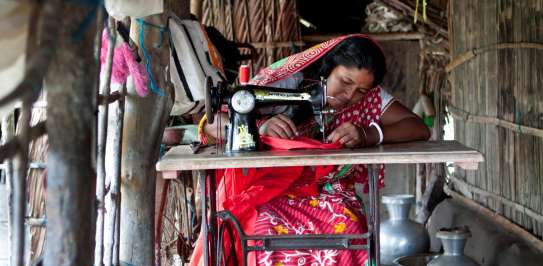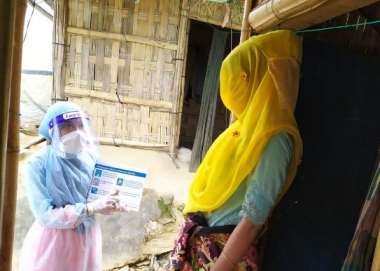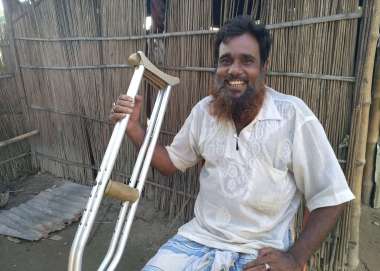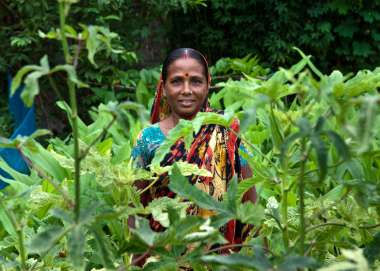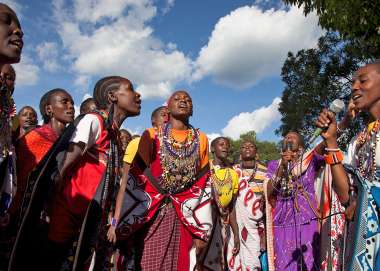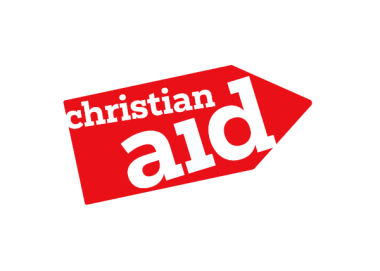We work using integrated approaches to disaster risk management, climate change, resilient livelihoods, emergency preparedness and response, inclusive market development, gender and social equity.
We work with 17 partners in 20 of the most vulnerable districts of Bangladesh across the southern coastal region, north-west, and central flood and 'haor' (wetland) areas.
The programme promotes access to just and equitable resources and supports the creation of resilient and thriving livelihoods for marginalised people and communities.
We support the establishment of rights for marginalised communities to access land, water, forests, and basic government services, and want to see local and national institutions be more accountable in their decision making.
We believe the following strategic approaches are essential:
- capacity building
- research and advocacy
- innovation and learning
- strategic communications
- and technical expertise on climate change, disaster risk reduction and livelihoods, always taking account of inclusion.
Escalating violence in Myanmar’s Rakhine State in late August 2017 has forced hundreds of thousands of people from their homes, including many Rohingya refugees who have fled to Bangladesh, fearing for their lives.
Our aims
- Empower socially excluded communities to claim their rights, entitlements and expand their power in social and economic spaces.
- Create and facilitate an ‘enabling space’ among community-based organisations (CBOs), civil society organisations, the private sector and the state to develop pro-poor policies and institutions and find large scale innovative solutions to address poverty.
- National level policy and advocacy work for the introduction of socially just policies where none currently exist, and ensuring those that are already in place are effectively implemented.
Image credits and information
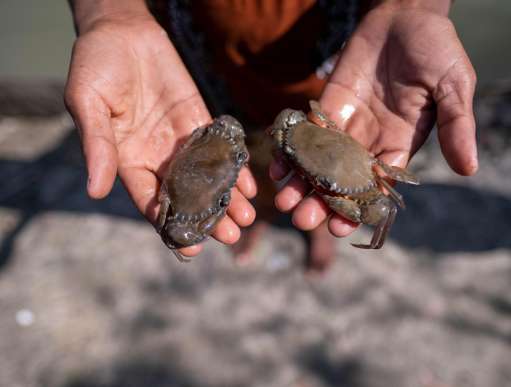
Crab rearing opened a huge opportunity for profitable work due to the low monetary and time investment needed. I usually have more than 50% profit through my work each month
Our work
Climate change and disaster risk reduction
Christian Aid Bangladesh has a track record in developing technical skills, knowledge and capacity around climate change adaptation. Through our local partners, we have a wide reach and significant experience in disaster risk reduction and a proven ability over 35 years in delivering emergency food security and supporting communities to rebuild their livelihoods.
Key achievements
Resilient livelihoods
Together with our partners, we have successfully implemented sustainable resilient livelihoods projects and scaled up existing good practices in various agro-ecological zones of Bangladesh.
Diversified income generation options and climate adaptive livelihood measures – including floating gardens and hanging vegetables in water logged areas, saline tolerant rice, maize and sunflower varieties and duck rearing in 'haor' areas – have increased communities’ adaptability and resilience.
Community-led participatory vulnerability and capacity analysis (PVCAs) provide specific direction in risk reduction and resilience building. Our resilience work has so far reached more than 25,000 beneficiaries (80% of them women) in vulnerable geographical areas.
Inclusion
Our gender work cuts across all of our projects in Bangladesh, with 80% of those we reach being women.
We have empowered 700 Dalit (a member of the lowest caste) human rights defenders in the most marginalised pockets of Bangladesh, to seek to bring about long-term change.
We are engaged with policymakers and government ministries to ensure that the needs of Dalits are taken into consideration, and they are not left behind.
Our work on indigenous human rights has also allowed us to empower plain land indigenous communities (those living in lowland areas).
Intersectionality – how overlapping social identities, such as race, class, and gender, contribute to discrimination and the ability to access rights and opportunities – has become a distinctive aspect of our programming, as we reach the most marginalised communities facing multiple layers of discrimination.
Governance
In our governance work we ensure the participation and collaboration of non-state actors (an individual or organisation that has significant political influence but is not allied to any particular country or state) and local authorities in addressing effective planning, implementation and responsive delivery of public services – mainly health, education, agriculture and social welfare.
We have been working to strengthen the capacity of non-state actors, NGOs, government coalitions and the poorest community members by forming and strengthening CBOs through platforms at greater ward level.
Access to justice
Ensuring access to justice for all enables communities to realise their rights. Christian Aid has continued to provide a comprehensive range of services across the entire Bangladesh justice system, including both informal systems and the courts (from the lowest to the highest), in all areas of law, particularly criminal, constitutional, family, labour and land.
This includes individual legal aid (advice, referral, mediation and litigation), advocacy and investigations, as well as rights awareness, capacity building, and collaboration with various government agencies.
Humanitarian response
In 2016, Christian Aid Bangladesh worked on four humanitarian response projects reaching 8,500 cyclone and flood affected households. The projects included food security, WASH (water, sanitation, and hygiene), shelter, livelihoods and early recovery components. They reached excluded communities in the most remote areas.
Christian Aid supports 600 vulnerable waterlogged-affected families in the southwest by strengthening their livelihoods, enhancing knowledge and capacity. With UNDP funding, we also implemented a flood recovery and resilience project supporting 80 households in the southeast.
Through our Shifting the Power project we are building the humanitarian response capacity of 11 local/national organisations, promoting women-led responses and encouraging other organisations and government to get involved.
Making markets work for the poor
Christian Aid is seeking to build its links with the private sector to enhance our work on livelihoods and market development. We continue to develop the social enterprise skills of poor people, increasing their power in the market and ensuring their access to and control over productive resources.
Other donors and projects
In 2016, Christian Aid successfully implemented several humanitarian response projects with funding from ECHO, START and Irish Aid.
Christian Aid has been supporting the One Billion Rising movement to end violence against women. We are also engaged in the Right to Food campaign in Bangladesh and conducting a study on food consumption and wastage to better understand how to address food security and nutrition.
Along with DanChurchAid, HelpAge and ADD International, Christian Aid has formed the Leave No One Behind coalition to support the Sustainable Development Goals (SDGs) agenda of the same name. We are organising local and national level discussions to support policy-influencing activities.
